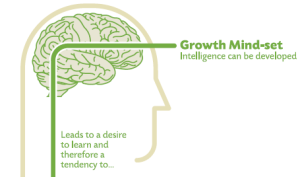As I’m reading Ellen J. Langer’s The Power Of Mindful Learning, this post really comes to the point of mindfulness in teaching.
 In a previous post, I stated why I think developing a growth mindset with students is so important. It makes students:
In a previous post, I stated why I think developing a growth mindset with students is so important. It makes students:
- Have high expectations of what they can achieve and be inspired by the success of others.
- Accept that hard work and effort is needed to master new ideas and achieve excellence.
- Accept that they need to be resilient and so keep going when things get tough.
Whilst it is obviously important to develop this culture with staff, through their teaching and interactions with students, if it’s going to be embedded across a school, we need to get students thinking about mindset. By getting them to think about mindset, we will encourage them to reflect on themselves as learners and then hopefully change their approach to learning. There’s no quick fix here, but I think there are opportunities all around us in schools, that can be exploited for this purpose.
View original post 786 more words
